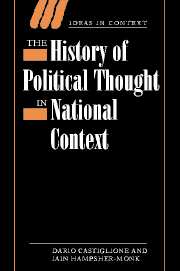Book contents
- Frontmatter
- Contents
- List of contributors
- Preface
- 1 Introduction The history of political thought and the national discourses of politics
- 2 The voice of the ‘Greeks’ in the conversation of mankind
- 3 History of political theory in the Federal Republic of Germany: strange death and slow recovery
- 4 A German version of the ‘linguistic turn’: Reinhart Koselleck and the history of political and social concepts (Begriffsgeschichte)
- 5 One hundred years of the history of political thought in Italy
- 6 Discordant voices: American histories of political thought
- 7 The professoriate of political thought in England since 1914: a tale of three chairs
- 8 The history of political thought and the political history of thought
- 9 The rise of, challenge to and prospects for a Collingwoodian approach to the history of political thought
- 10 Towards a philosophical history of the political
- 11 ‘Le retour des émigrés’? The study of the history of political ideas in contemporary France
- 12 National political cultures and regime changes in Eastern and Central Europe
- 13 The limits of the national paradigm in the study of political thought: the case of Karl Popper and Central European cosmopolitanism
- 14 Postscript. Disciplines, canons and publics: the history of ‘the history of political thought’ in comparative perspective
- Index
- IDEAS IN CONTEXT
9 - The rise of, challenge to and prospects for a Collingwoodian approach to the history of political thought
Published online by Cambridge University Press: 23 September 2009
- Frontmatter
- Contents
- List of contributors
- Preface
- 1 Introduction The history of political thought and the national discourses of politics
- 2 The voice of the ‘Greeks’ in the conversation of mankind
- 3 History of political theory in the Federal Republic of Germany: strange death and slow recovery
- 4 A German version of the ‘linguistic turn’: Reinhart Koselleck and the history of political and social concepts (Begriffsgeschichte)
- 5 One hundred years of the history of political thought in Italy
- 6 Discordant voices: American histories of political thought
- 7 The professoriate of political thought in England since 1914: a tale of three chairs
- 8 The history of political thought and the political history of thought
- 9 The rise of, challenge to and prospects for a Collingwoodian approach to the history of political thought
- 10 Towards a philosophical history of the political
- 11 ‘Le retour des émigrés’? The study of the history of political ideas in contemporary France
- 12 National political cultures and regime changes in Eastern and Central Europe
- 13 The limits of the national paradigm in the study of political thought: the case of Karl Popper and Central European cosmopolitanism
- 14 Postscript. Disciplines, canons and publics: the history of ‘the history of political thought’ in comparative perspective
- Index
- IDEAS IN CONTEXT
Summary
I need to begin by sounding a sceptical note. It makes little sense to speak of a British – still less an English – style of writing the history of political thought, if only because the English language is the principal medium of communication in Australasia and North America, two places in which this kind of history has recently been vigorously practised and very ably discussed. It is certainly possible to say, however, that within these anglophone intellectual communities a particular style has been developed in the course of the present generation which stands in strong contrast with a number of European approaches to the study of political thought, including the current German preoccupation with Begriffsgeschichte and the continuing French passion for post-structuralist and especially deconstructionist methodologies. My focus in the following remarks will accordingly be on this anglophone intellectual community rather than on the idea of national contexts and traditions of thought.
It likewise makes little sense to speak of the approach I wish to consider as an approach specifically to the history of political thought. It is true that some of the most interesting contributions to the theoretical debate have been made by practitioners of this particular sub-discipline, as the names of John Dunn, Peter Laslett, John Pocock and James Tully sufficiently attest. But the questions they have raised are questions about how best to set about interpreting any kind of text, and in discussing their views I shall not limit myself – any more than they do themselves – to specifically political examples.
- Type
- Chapter
- Information
- The History of Political Thought in National Context , pp. 175 - 188Publisher: Cambridge University PressPrint publication year: 2001
- 9
- Cited by

